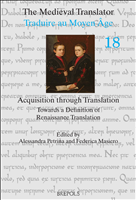2020 - Brepols
E-book
Digital Version
Télécharger | Copier/coller | Impression
Acquisition through Translation : Towards a Definition of Renaissance Translation
380 p.
- The definition of translation in Renaissance Europe is here proposed as a process of acquisition: the book studies how a number of European languages, finding their identification in the newly evolving concept of nation, shape their countries' vernacular libraries by appropriating ancient and contemporary classics.The emergence of standard modern languages in early modern Europa entailed a competition with the dominant Latin culture, which remained the prevalent medium for the language of science, philosophy, theology and philology until at least the eighteenth century. In this process, translation played a very special role: in a number of significant instances we can identify in the undertaking of a specific translation a policy of acquisition of classical - and by definition authoritative - texts that contributed to the building of an intellectual library for the emerging nation. At the same time, the transmission of ideas and texts across Europe constructed a diasporic and transnational culture: the emerg
- ing vernacular cultures acquired not only the classical Latin models, incorporating them in their own intellectual libraries, but turned their attention also to contemporary, or near-contemporary, vernacular texts, conferring on them, through the act of translation, the status of classics. Through the examination of case studies, that take into account both literary and scientific texts, this volume offers an overview of how early modern Europe developed its vernacular national literatures, following the model suggested in the late Middle Ages, through a process of acquisition and translation. [Publisher's text].
- Special access authorizations may apply; please contact us for further information.


